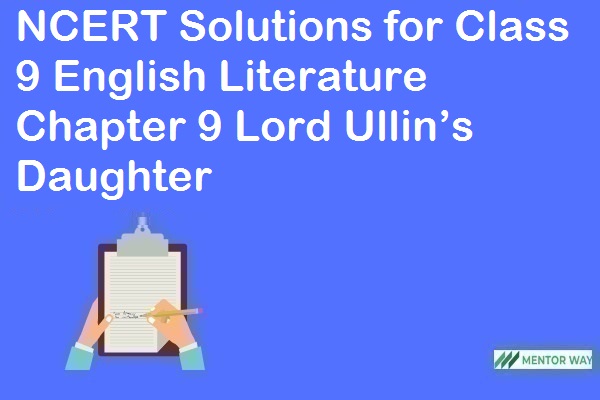NCERT Solutions for Class 9 English Literature Chapter 9 Lord Ullin’s Daughter
10 min read
NCERT Solutions for Class 9 English Literature Chapter 9 Lord Ullin’s Daughter
NCERT Solutions for Class 9 English Literature Chapter 9 Lord Ullin’s Daughter is part of NCERT Solutions for Class 9 English. Here we have given NCERT Solutions for Class 9 English Literature Chapter 9 Lord Ullin’s Daughter.
| Board | CBSE |
| Textbook | NCERT |
| Class | Class 9 |
| Subject | English Literature |
| Chapter | Chapter 9 |
| Chapter Name | Lord Ullin’s Daughter |
| Number of Questions Solved | 20 |
| Category | NCERT Solutions |
NCERT Solutions for Class 9 English Literature Chapter 9 Lord Ullin’s Daughter
TEXTUAL EXERCISES
(Page 74)
Questions 1 to 3 carry no questions.
Answer
There is no question asked on it. Meant for working out at class level.
Question 4.
Now, listen to the poem again. As you listen this time, read the poem aloud, along with the recording. Try to copy the rhythm of the recording.
Answer
Meant for class level. The rhythm of the tape-recording will be clearly understood. It will be understood and felt through the ‘beat’ at the end of each stanza.
Question 5.
On the basis of your understanding of the poem, answer the following questions by ticking the correct choice.
(a) Lord Ullin’s daughter and her lover are trying to ______
- escape the wrath of her father
- settle in a distant land
- challenge the storm in the lake
- trying to prove their love for each other.
(b) The boatman agrees to ferry them across because ____
- he has fallen in love with Lord Ullin’s daughter.
- he wants to avenge Lord Ullin.
- he has lost his love.
- he is sorry for the childlike innocence of the lady.
(c) The mood changes in the poem. It transforms from _____
- happiness to fear.
- anxiety to grief.
- fear to happiness.
- love to pain.
(d) The shore ofLochgyle has been referred to as ‘fatal shore !’ The poetic device used here is _____
- metaphor.
- simile.
- transferred epithet.
- onomatopoeia.
Answer
(a) 1
(b) 4
(c) 2
(d) 1
Question 6.
In pairs copy and complete the summary of the poem with suitable words! expressions.
A Scottish Chieftain and his beloved were (1) _____ from her wrathful father. As they reached the shores, the (2) _____ told a boatman to (3) ____ them across Lochgyle. He asked him to do it quickly because if (4) ____ found them, they would kill him. The boatman (5) ____ to take them not for the (6) _____ that the Chieftain offered but for his (7) _____. By this time, the storm had (8) ____ and a wild wind had started blowing. The sound of (9) _____ could be heard close at hand. The lady urged the boatman (10) _____ as she did not want to face an angry father. Their boat left the (11) _____ and as it got caught in the stormy sea, Lord Ullin reached the deadly (12) _____ . His anger changed to wailing when he saw his daughter (13) ____. He asked her to return to the shore. But it was (14) ____ as the stormy sea claimed his daughter and her lover.
Answer
- fleeing
- Chieftain
- ferry
- Lord Ullin’s men
- promised
- money
- beloved
- grown loud
- tempest
- to make haste
- stormy land
- shore
- being surrounded by stormy water
- vain
Question 7.
Why does Lord Ullin’s daughter defy her father and elope with her lover ? (Stanza 1)
Answer
Lord Ullin’s daughter loves the Chieftain passionately. She wants to marry him as both love each other beyond description. But Lord Ullin doesn’t allow her to marry due to various reasons. So she has no alternative except to elope with her lover.
Question 8.
Give two characteristics of the boatman who ferries the couple across the sea.
Answer
The two characteristics of the boatman are : one, he is courageous. Second, he doesn’t care for money. Then he is a man of words. He risks everything to fulfil his words.
Question 9.
“Imagery” refers to something that can be perceived through more than one of the senses. It uses figurative language to help form mental pictures. Campbell used vivid, diverse and powerful imagery to personify the menacing face of nature. Pick out expressions that convey the images of anger in the following stanzas
” alt=”” aria-hidden=”true” />
Answer
” alt=”” aria-hidden=”true” />
Question 10.
Read the following lines and answer the questions that follow
“His horsemen hard behind us ride ;
Should they our steps discover,
Then who will cheer my bonny bride When they have slain her lover ?”
- Who is ‘his’ in line 1 ? Who does ‘us’ refer to ?
- Explain : ‘cheer my bonny bride’. .
- Why would the lover be slain ?
Answer
- ‘His’ stands for Lord Ullin. ‘Us’ refers to Lord Ullin’s daughter and her lover Chieftain.
- It means ‘who will console my attractive and beautiful beloved’ (after my death).
- The lover would be slain because his beloved’s father, Lord Ullin, has been chasing them. He has not given his permission to his daughter to marry her lover.
Question 11.
“The water-wraith was shrieking.” Is the symbolism in this line a premonition of what happens at the end ? Give reasons for your answer. (Stanza 7)
Answer
The symbolism in this line is a forewarning of what happens at the end. The wind has raised the water into a kind of violent seastorm. This seastorm changes into a tempest. It drowns Lord Ullin’s daughter and her lover.
Question 12.
The poet uses words like ‘adown’, ‘rode’ which contain harsh consonants. Why do you think the poet has done this ? (Stanza 8)
Answer
The poet has done so to suggest the great anger of Lord Ullin and his armed men, chasing his daughter and her lover. This ‘danger’ to their lives is also suggested by the words like ‘wilder’, ‘drearer’, ‘adown’, ‘rode’ and ‘sounded’.
Question 13.
In Stanza 10, the poet says—
The boat has left a stormy land,
A stormy sea before her, …….
- In both these lines, the word “stormy” assumes different connotations. What are they ?
- The lady faces a dilemma here. What is it ? What choice does she finally make ?
Answer
- ‘A stormy land’ suggests that Lord Ullin’s daughter’s elopement has stirred a ‘storm’ (squall) in her family. It is on the land. Lord Ullin is after her with his armed men. ‘A stormy sea’ gives out the hint that there is a seastorm rising at present in the sea.
- The dilemma is that the lady has ‘storm’ on both her sides. She can’t return as there is ‘storm’ at home. She can’t go forward as the ‘seastorm’ is ready to drown her. She finally chooses to face the seastorm. She thinks it right to be killed with her lover than to live without him.
Question 14.
- “Lord Ullin reached that fatal shore” just as his daughter left it. (Stanza 11).
Why is the shore called fatal ? - Why does Lord Ullin’s. wrath change into wailing on seeing his daughter ?
Answer
- The shore is called ‘fatal’ because Lord Ullin will see his daughter being drowned by the seastorm.
- Lord Ullin’s anger changes into wailing on seeing his daughter. He now sees the tempest is drowning his daughter. That’s why, he calls up his daughter as his fatherly instinct is now over him. He would forgive her highland chief. He asks them to return to the shore.
Question 15.
“One lovely hand she stretch’d for aid.” Do you think Lord Ullin’s daughter wanted to reach out to her father ? (Stanza 12) If yes, why ?
Answer
I think that Lord Ullin’s daughter really wanted to reach out to her father now at this point of life and death. A daughter would always incline more towards her father than her lover at such a critical moment.
Question 16.
You are already familiar with the poetic device “alliteration”. The poet makes extensive use of the same throughout the poem. Pick out as many examples of alliteration as you can.
Example : fast – father’s; horsemen-hard.
Answer
” alt=”” aria-hidden=”true” />
Question 17.
What is the rhyme-scheme of the poem ?
Answer
The rhyme scheme is ab,ab. In the last stanza it is ab, cb.
Question 18.
Imagine you are one of the chiefs of the cavalry riding behind Lord Ullin. You and your men ride for three days at the end of which you reach the shore. Narrate your experience as you witnessed a father lamenting the loss of his child, in the form of a diary entry. (V. Imp.)
Answer
11.15 pm Sunday, 26 April, 2015
At last after three days we reached the shore. It was with great difficulty that we reached there. To our horror, the wild tempest was beating the shore horribly. It was rising upto the skies. The water seemed to be touching the zenith. Then I saw Lord Ullin wailing bitterly over the drowning of his child. Seeing her drowning he was raising his hands upwards. He was crying most piteously.
Now Lord Ullin was not Lord Ullin but a helpless father seeing his own daughter drowning. The storm was violent and unabated. Soon it claimed the lives of his daughter and her lover, the chieftain of Ulva isle. The scene was heart-moving. I became emotional seeing the wailing of a father over the drowning of his child.
Question 19.
Imagine that you are Lord Ullin. You bemoan and lament the tragic loss of your lovely daughter and curse yourself for having opposed her alliance with the chieftain. Express your feelings of pain and anguish in a letter to your friend.
Answer
Uhan Glen Scotland
10 November, 2015
My dear Lord Gulva
I am really in a great shock over the tragic loss of my lovely daughter. I feel as if one part of my body has been cut. I must have understood my dearest daughter’s heart and myself have sorted out the matter. It was really bad on my part to have put my armed men to hunt for her and her lover. I must have understood that love is a basic instinct. I understand that it can’t be repressed. For ever and for ever I shall curse myself with a feeling.
It is that I myself am the murderer of my bonny and beautiful daughter. She was drowned by the wild tempest before my eyes and I couldn’t do anything. She extended her hand to me for help. But I couldn’t save her. I remember her innocent face crying for help. She was then between life and death at that crucial moment ! And I, a helpless father, could do nothing to save her ! But it’s all over. I shall live with this stigma in my mind that I am the killer of my own daughter.
Yours sincerely
Lord Ullin
Question 20.
In pairs, argue in favour of or against the topic “Lord Ullin’s daughter was right in her decision to defy her father.” Give logical and relevant reasons, and present your point of view to the class.
Answer
Lord Ullin’s daughter was right in her decision to defy her father
(For the Motion)
Lord Ullin’s daughter was right in her decision to defy her father. We must know that love is a God-given gift. Then love is not something that is at someone’s command. It is very essential for life and its propagation. Joy, happiness, pleasure etc, are its products or its faces. These are nourished and nurtured by love. Like love is a gift of the gods, falling in love too is the gift of gods. So when Lord Ullin’s daughter fell in love with the Chieftain she was following the dictates of the gods. So she eloped with the Chieftain as per the desire of the divine powers and her spiritual urges.
Thus nothing was wrong in their eloping together as her father would have got them killed. Secondly, love is something that must not be denied at any cost. It must be allowed to blossom since it is the fountainhead of all life. Obviously, she and the Chieftain were following the divine dispensation. It was opposed by earthly forces in the form of her father. To me nothing was wrong in Lord Ullin’s daughter to defy her father. If she had been wrong, her father couldn’t have asked her in the end to return. She was in the middle of the pitiless waves of the sea which drowned her and her lover, the Chieftain.
Lord Ullin’s daughter was right in her decision to defy her father
(Against the motion)
Lord Ullin’s daughter was not right in her decision to defy her father. It is a known fact that all parents love their children to the maximum. Their parents love them very much. They can do and shall do anything for the welfare and well-being of their children. Then it is the moral duty of the children to respect their parents’ feelings and emotions. Children are and shall always be children before their parents. Before them they are immature. They don’t see the right and wrong when they are young.
They may be swayed by emotions and commit something immoral. They may fall in love with somebody not approved by their parents. In marrying the person against the desire of the parents is something that is never allowed by the parents. This involves social level, social and economic levels, sincerity, faithfulness, social prestige, equality in status, etc. Marriage is a two-sided affair and once-in-a-life opportunity. So children need to leave this decision for them to their parents.
Their parents are always concerned more about their well¬being. But Lord Ullin’s daughter did something wrong in defying her father thus ruining his social status and standing. This social prestige is as essential for life as food and water. So Lord Ullin did nothing wrong in sending his men to kill them for the honour of his family and clan. Children mustn’t be allowed to do any thing against their parents’ interests and social standing. Thus Lord Ullin’s daughter mustn’t have defied her father at all.
We hope the NCERT Solutions for Class 9 English Literature Chapter 9 Lord Ullin’s Daughter help you. If you have any query regarding NCERT Solutions for Class 9 English Literature Chapter 9 Lord Ullin’s Daughter, drop a comment below and we will get back to you at the earliest.



